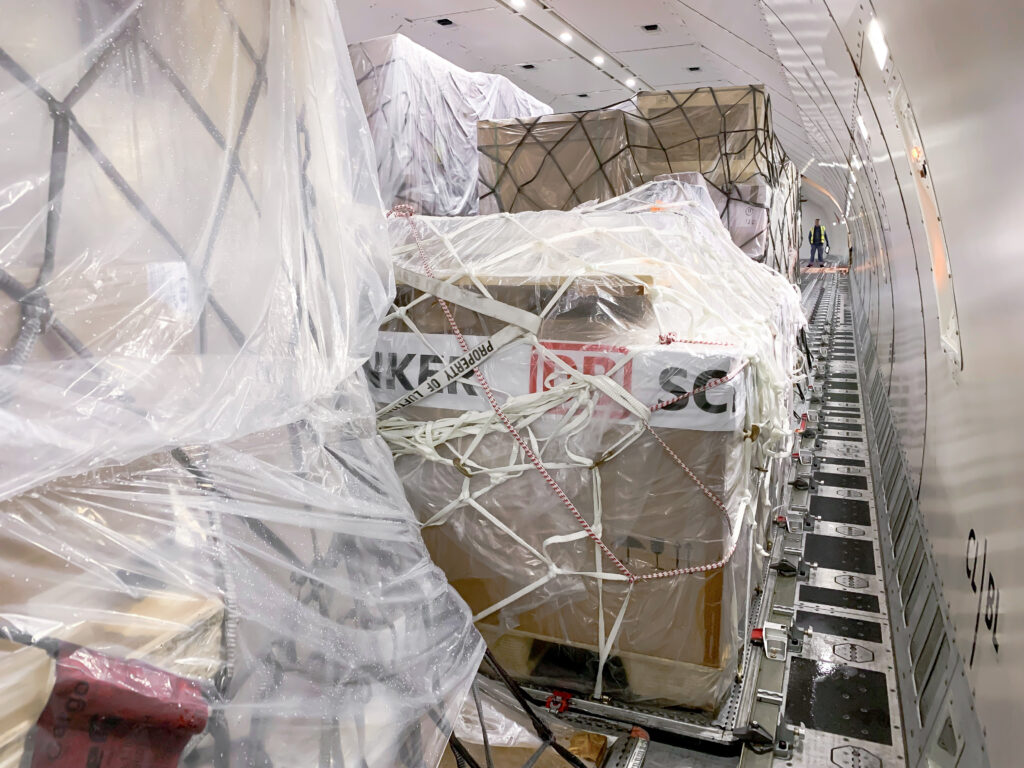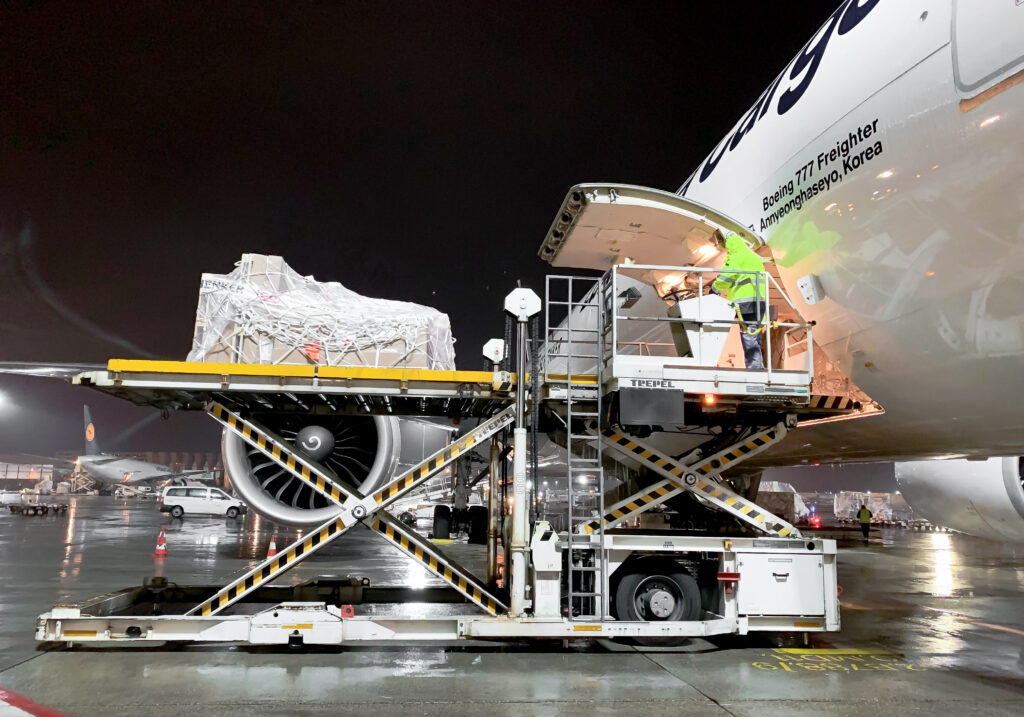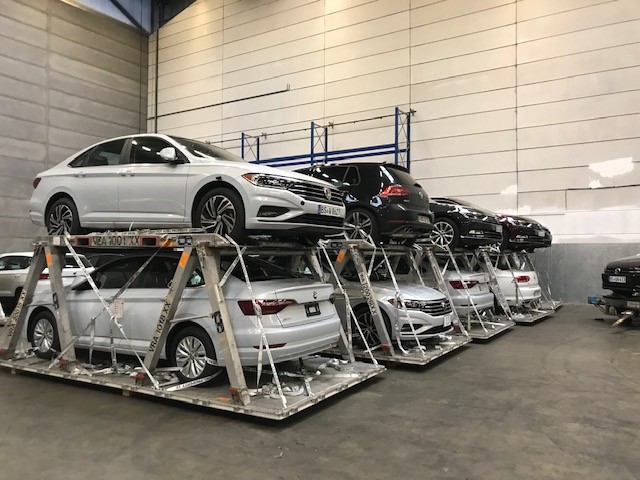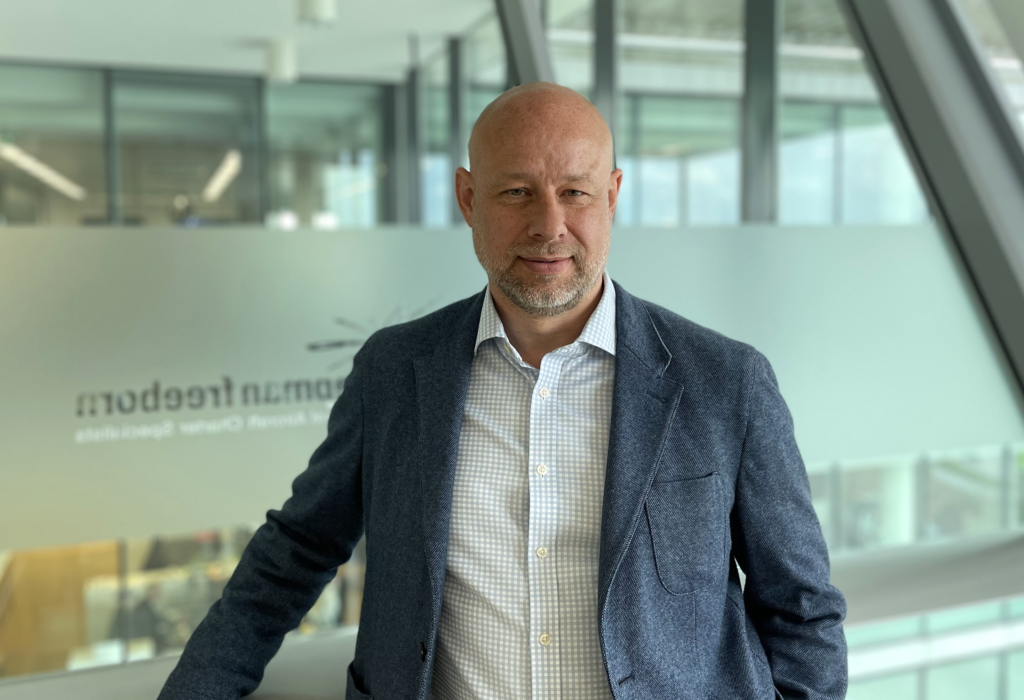Cargo carriers drive the automotive supply chain
07 / 08 / 2023

Photo: Kerry Logistics
Demand for automotive shipments has returned stronger than before the pandemic, and in an industry where time is of the essence, airfreight still delivers.
There are many links to the automotive supply chain, not least that of the big all-cargo carriers, many of which play an important role in the business.
Luxembourg-based B747 freighter operator Cargloux, for example, transports both complete cars and car parts on a regular basis, on its scheduled flights and on specialised charters.
It moves all kinds of cars for sporting events, shows and testing, as well as vehicles for the film industry and private usage, explains Domenico Ceci, the airline’s executive vice president sales & marketing.
Cargolux offers a dedicated product, CV power, to handle these specialised automotive shipments. CV power transports are organised all year around throughout the globe and, although the carrier saw a decline in such shipments during Covid, demand has recovered and indeed is now beyond pre-pandemic levels, Ceci reports.
CV power shipments are mostly undertaken out of the big players in the European automotive industry, countries such as Germany, Italy and the UK, with customers benefiting from it being a specialised product that guarantees professional handling through purpose-built equipment including car racks, protective lashing and protectors, as well as dedicated procedures and safeguarding measures such as regular quality checks along the route.
“Our slogan is, “You name it, we fly it”, which also indicates that, in addition to having clear, defined processes, we have kept the flexibility we were always known for,” Ceci asserts.

Photo: DB Schenker/ Mario Arnold
Time-sensitive shipments
The big forwarders also play their role in the automotive industry. Asok Kumar, EVP global airfreight at one of the biggest, DB Schenker, notes that airfreight is not the primary mode of transport for the automotive industry. “However, due to increasing demand and sometimes time-critical requests, this vertical market is one of the biggest for us.
“There is not a single day when DB Schenker does not transport at least some automotive parts by plane around the globe,” he continues. “These are high cargo trades, particularly based on the production facilities of OEMs [original equipment manufacturers] and their suppliers.”
Plus, he adds: “We also have market-leading competence centres in place that handle finished vehicles.”
Meanwhile, ad hoc shipments form another important element of Schenker’s daily business, some of it auto-related. Moreover, this segment became even more relevant during the Covid pandemic, Kumar explains. The stability of the production lines of manufacturers needed to be maintained despite the pressures of the pandemic.
DB Schenker supports the majority of the key automotive manufacturers and brands in the market. Its customers include the world’s largest OEMs as well as tier 1 and tier 2 suppliers.
Related cargo volumes are particularly high on routes to production-heavy countries and to big consumer markets for the automotive aftermarket, Kumar says.
It is also a growing market for the Essen-headquartered forwarder that forms part of Germany’s Deutsche Bahn (DB). “As we keep expanding our own charter flight network, we provide new and reliable capacities for our customers. Many of the new flights and routes are especially booked by customers coming from the automotive segment,” Kumar says.
DB Schenker, like other forwarders, does its best to provide customers with the optimal transport solution depending on clients’ specific needs and preferences.
In case of unpredicted issues in one mode of transport, another can help to stabilise supply chains, Kumar points out. For example, airfreight can support ocean freight shipments when there is congestion at ports.
And, significantly, the automotive industry is currently in a process of transformation and this also affects related supply chain processes, Kumar suggests.
“We need to combine the transport of legacy components with the increasing demand for electronic and battery-related parts as well as semiconductors,” he says.
“Hence, we renamed the relevant vertical market unit within DB Schenker from ‘Automotive’ to ‘Automobility+’. Also, we have installed a group of dedicated e-mobility experts.”
DB Schenker is heavily expanding its offering of green transport solutions. Kumar adds: “Our automotive customers are also increasingly turning to the growing range of CO2-neutral shipping possibilities – for example by booking biofuel SAF [sustainable aviation fuel] for flights and/or deciding to go for electric trucking to/from airports.”
Finally, DB Schenker recently entered into a new partnership with Stuttgart, Germany-headquartered car manufacturer Porsche. “As the official logistics partner for the Porsche GT4 e-Performance tour, we transport the electric car to racing tracks worldwide – and we do so by using only green logistics solutions via road, rail and ocean,” Kumar advises.

Photo: DB Schenker/ Mario Arnold
Full-freight solutions
Another of the big logistics service providers that enjoys a successful automotive business is Kerry Logistics. Pieter Hoogvliet, its EMEA [Europe, Middle East and Africa] business development director, says that Kerry has been managing global shipments for its automotive customers for over 20 years.
The company’s full-freight solutions in this vertical market include transportation by sea, rail and truck as well as by air. Depending on the requirement, it also arranges ad-hoc shipments and time-sensitive airfreight shipments for spare parts and finished vehicles.
Kerry is experienced in shipping under ATA Carnet for temporary imports for race vehicle teams as well.
It has handled finished cars for race events and rallies, as well as for business car dealer trades and personal requests.

Photo: Kerry Logistics
“For us, every vehicle is handled as an exclusive vehicle because we maintain high standards for all our shipments. Our customised, value-added services mean that we can meet all our customers’ requirements for these specialist shipments,” Hoogvliet states.
While Kerry has enjoyed long-term co-operation with those whom Hoogvliet describes as its “trusted customers” and therefore enjoys stable volumes in this market, there is also some seasonality in this vertical, he says. Right now, due to a challenging market situation and global economic problems, “We have seen a slow first half to 2023 compared to our half-year historic average.”
But its automotive business is handled in “all major trade lanes and continents”, he continues. “Kerry Logistics can deliver vehicles and spare parts all over the globe, whether we need to deliver to a major city or a small island.”
Hoogvliet believes that customer requirements such as transit time reliability and flexibility are key to success for a logistics services provider like Kerry operating in this market.
“Next to that, a forwarder needs to have the knowledge to handle parts and the quality procedures in place to handle finished vehicles.
“Lashing vehicles into a container or onto a ULD requires professional attention, and that is why we only use qualified and experienced staff to handle these shipments,” he notes.
Rapid reaction
Charter brokers play a role in the global automotive business, too. One of the biggest, Chapman Freeborn, for example, is involved in moving everything from small parts for production via its on-board courier (OBC) service to chartering dedicated aircraft of any size for production ‘line stop’ parts.
Plus, says Russell Cook, its industry vertical director: “For complete cars we carry prototype vehicles for testing, and customer vehicles moving to dealer locations, as well as [handling charters] for private individuals.

Russell Cook. Photo: Chapman Freeborn
Brokers like Chapman Freeborn are asked for their involvement for many reasons, but time is mostly the deciding factor, Cook notes. “Stopping an automotive production line is extremely costly, and the movement of emergency time critical parts via charter and OBC can mitigate some of this.
“With regard to prototypes, it can also be a time-bound move – with vehicle development there are many variables to align on timing.”
Plus, he points out: “Proving grounds (vehicle test locations) can also be quite remote and some will open on time windows for certain tests. Couple this with the confidential nature of the vehicles, and charter can often provide the best solution.”
Outside of the industry requirements on shipping hazardous materials, the key to success for a charter broker active in the automotive sector such as Chapman Freeborn seems to Cook to be able to “move quickly and communicate clearly”.
It has specialist teams with specialist knowledge throughout the group who understand the automotive vertical. “That said, the entire Chapman Freeborn team are consummate professionals in time-sensitive transport, whether that’s OBC, cargo, passengers or livestock,” he declares.
Chapman Freeborn is handling more automotive business than ever at the moment, Cook says, for no single reason although various part shortages have driven increased activity. The automotive industry is also going through an upheaval with the advent of electric, hybrid and alternate fuel vehicles coming to market. Furthermore, “OEMs globally are rationalising and adapting their manufacturing to accommodate new technology, parts and as a consequence their supply chains can come under greater strain.”
Chapman Freeborn works with key automotive original equipment manufacturers and tier suppliers either directly or through freight forwarders in this business All in all, “Automotive is a key market segment and a focus for Chapman Freeborn going forward,” Cook stresses.














